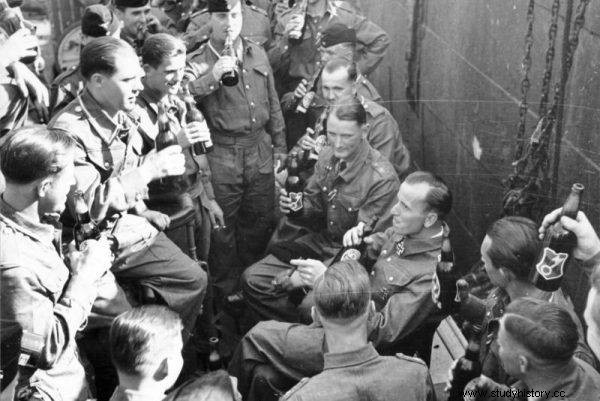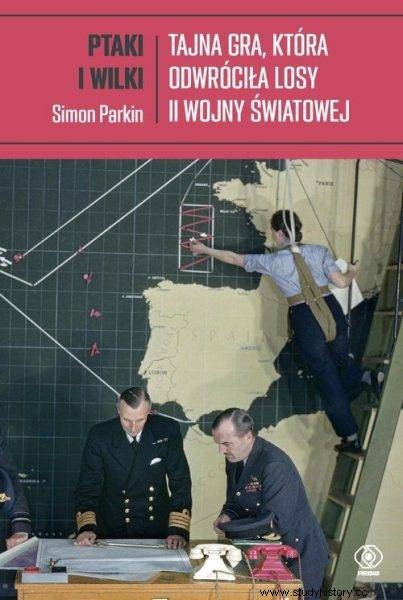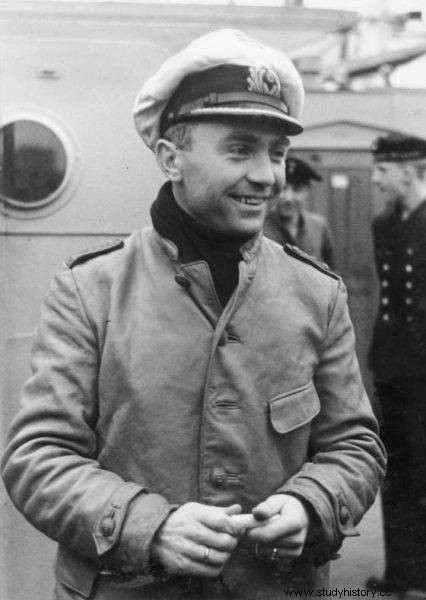Until the German U-boats launched some of their seven-meter torpedoes, known as "eels," their sailors did not even have enough space to change upright. This encouraged them to attack the enemy ship as soon as possible.
Champagne poured in streams. The elegant French restaurant was full of guests - German sailors. Three men were seated at one of the tables - one of the most dangerous people in the world at the time, especially at sea.
Günther Prien, Joachim Schepke and Otto Kretschmer. They were all commanders of the U-boats who inflicted enormous losses on convoys supplying Great Britain. The men had a great time, though they were not friendship but rather competition. Now Kretschmer seemed to be in charge. He was recently decorated and was honored to dine with Adolf Hitler himself. The German press adored its aces, treated them as celebrities are treated today. As their ships entered ports, crowds greeted them.
At one point, Schepke offered the other officers a bet. Whoever reaches the first level of two hundred and fifty thousand tons of sunken ships will be able to eat and drink at will at the expense of the other two. The bet has been accepted. It was November 1940.
Wolfpacks
The U-boat commanders had reason to be happy. At that time, they caused heavy losses to British ships. The British Isles were not self-sufficient. While scientists in Cambridge have calculated that poverty could feed the inhabitants, the lack of oil and many other commodities would make life virtually impossible there. It all depended on the supplies, and these were lame due to attacks by German submarines.
“Worse, the U-boats sank their ships faster than they could build, and operated mostly at night. Churchill was very anxious and preoccupied with this situation, writes Simon Parkin in Birds and Wolves. The secret game that turned the fate of World War II in which he describes the fight between the British and U-boats.

After conquering France, the Germans moved the U-boat base from the Baltic to Brittany on the Atlantic. It was a great change for the sailors. Wine and women.
The basis of the success of German submarines was the wolf herd strategy. It was invented by Admiral Karl Dönitz, a veteran of naval combat. During World War I he was taken prisoner by the British and even ended up in a center for the mentally ill in Manchester - although it is not clear whether he really had mental problems or simulated . At least he had time to think about the details of the war at sea. Then he came to the conclusion that the U-boats should attack not alone, but in packs. Parkin writes:
The idea was taken from wolves from children's fairy tales, cooperating in the hunt. By hunting in packs, they could stun and gawk a prey too large to be dealt with alone. The community also made it possible for the animals to care for the wounded without slowing down the herd.
After returning to Poland, Dönitz consistently persuaded his superiors to adopt the new tactics. Hitler's rise to power and his rearmament plan offered opportunities for people like Dönitz. And although at the beginning of the war his U-Boat fleet was not as numerous as he dreamed of, his wolves seemed to be really hungry.
As late as May 1939, U-boats were practicing their tactics in the Bay of Biscay. The results of the nautical games were promising. What's more - the first losses that the British suffered after the declaration of the Third Reich on September 3, 1939, were caused by a submarine. The U-30 then sank the ocean liner s / s Athenia , sending nearly 120 people to the bottom.
Kill or be killed
After conquering France, the Germans moved the U-boat base from the Baltic to Brittany on the Atlantic. It was a great change for the sailors. Wine and women. The German occupier ordered that seafarers could exchange their brands at a much better exchange rate than in Berlin. So everything was cheap and available. But submarines also had another reason to drink champagne greedily. They might not have had the next opportunity to play anymore.
Although German propaganda would not praise the submarine crews, it became evident over time that the chances of seafarers getting to the end of the war were slim . As Parkin writes in his book, "During the Second World War, U-boats had the highest mortality rates of all troops in the air, on land and at sea, on both sides of the conflict." Losses were as high as 70 percent. Hardly anyone had a chance to survive 12 full missions that allowed them to apply for a transfer to another service.

The text is based on the book by Simon Parkin “Birds and Wolves. The secret game that turned the fate of World War II ", which has just been released by the Rebis publishing house.
But, as Parkin argues, these realities did not so much frighten the German sailors as strengthen the attitude of "kill or die". This led to an all-out war, in which children were also victims - such as those on the City of Benares, which was to take British girls and boys to a bomb-safe America.
Life on the U-Boot was terrible. Soon after she had set sail, the deck was smelly damp. As Parkin writes, despite training and exercise, "there was no way to prepare a person for the grim reality of submarines, wet tables, constantly moist towels and voracious lice."
There was no room for privacy, the seafarer did not even have their own berths. Of the two toilets, only one was available - the other was usually used as a warehouse . The dream was interrupted by the constant sounds of the ship's work - pistons, pumps, valves ... "The dormant mind had to learn to separate all this hurgot from the signs of danger announced by the siren with the Achtung! signal. Parkin writes.
Back then, in 1940, all this sad truth was not yet widely known, and the pubs in Lorient, Brittany, were full of merry German sailors. If they hadn't shaved after disembarking, they were all alike. For Dönitz, in order to increase the feeling of brotherhood among them, forbade submarine sailors to get rid of their facial hair. So they lost their personal qualities. It was the herd that mattered.
A few simple lines
As long as the U-boats were successful, the reality on the other side of the sea front was no better. Convoys were easy prey, and the ships' crews often ended up in the cold Atlantic waves. The ships did not have radars yet, and the tactics of the wolfpacks appeared to the Royal Navy as something mysterious.
In addition, such "virtuosos" like Kretschmer had their own killer ideas. His U-99 used to sway into the center of the convoy and fire torpedoes from there only up close. It was terrifyingly lethal. The Royal Navy ships were helpless. 1940 was a tragic year for the British in terms of the number of sunken ships and ships - it reached over a thousand. The Admiralty was rushing to look for a prescription - various nautical games were conducted to develop a technique of defense against "wolf packs".
Meanwhile, at the end of February, the ships of Prien, Kretschmer and others went to sea again. Dönitz wanted to transfer the latter to staff work. He warned that everyone must rest. "At sea, a tired captain is a threat," said the admiral. Kretschmer ignored the words.
On February 25, Prien found a convoy of nearly 40 ships and began to summon the herd. Kretschmer's U-99 showed up. The ships, however, were chased away by destroyers who, like sheep dogs, guarded their sheep. But here on March 6, Prien saw the large convoy again. Four U-Boats went to attack.
British ships were going down again. This time, however, the Royal Navy ships managed to sink the U-70, and immediately after that their depth charges hit the U-47 Prien. His radio stopped broadcasting. Dönitz refused to believe Prien's death and hoped that the ship's radio had simply broken. Also reportedly Hitler "aware of the impression that such news would make on the morale of society, personally forbade to inform about Prien's death" - writes a British journalist. The announcement of the death of one of the aces was not released until more than two months.

Dönitz refused to believe Prien's death and hoped that the ship's radio simply broke.
Schepke and Kretschmer remained at sea. In mid-March, they attacked again. Kretschmer fired 8 torpedoes, 7 of them hit the target. 5 ships went down. With such a result, he could safely return to Lorient. Meanwhile, however, the ships protecting the convoy dropped depth charges one after the other and it was necessary to hide.
Schepke was 60 meters below the surface of the water. The commander and his sailors counted 34 explosions near the ship. For the bomb to damage the ship, it had to explode no more than six meters from it. The one that exploded as 35th was clearly closer - the lights dimmed, the water began to leak. The U-100 Schepke descended to almost 230 meters - "a feat no U-boat has ever done before." The commander, however, was afraid that the ship would be crushed and ordered the emergence. When the U-100 was on the surface, Schepke from the kiosk wanted to assess the situation. Suddenly he saw a British destroyer coming straight at him. Moments later, HMS Vanoc tore the U-boat to pieces, crushing Schepke with his beak.
Kretschmer was spotted shortly afterwards. The bombs went again. One of them hit and damaged the depth gauge - without it the U-Boat was actually blind . The U-99 descended to a considerable depth, but as the interior of the ship began to fill with water mixed with oil, Kretschmer ordered it to emerge. He and his crew were captured by the sailors of HMS Walker, commanded by Commander Donald Macintyre. When the British saw the Zeiss binoculars on the German's chest - a gift from Dönitz - he confiscated it. She was much better than the British (many years after the war, Macintyre would send Kretschmer back his property).
Meanwhile, Walker's crew searched the U-boat. Of course, the Germans wanted to sink the ship, but they failed to get into the compartment where the explosives were stored. There was a strange drawing among the seized papers. "It showed a convoy and a submarine attacking him from the inside," Parkin writes. A few simple lines hid the secret of the U-Boats' successes. ”
A breakthrough in the fight in the Atlantic was approaching. British strategists began to develop an effective tactic for fighting the U-boats. Soon the wolves will become the prey ...
